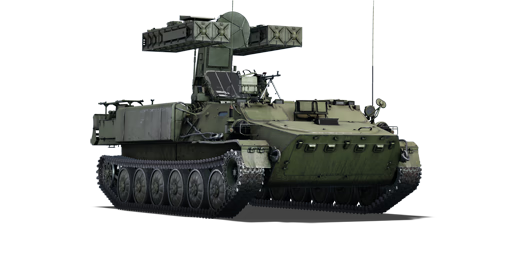



The Strela-10M2 (Lit. Arrow; NATO codename: SA-13 Gopher) is one of the missile systems that composed the extensive air-defence layers of Soviet and Warsaw Pact ground forces. As the direct upgrade of the previous 9K31 Strela-1 systems, the Strela-10M2 systems were developed as a stop-gap before the new ZPRK 2S6 system could be developed by the 1970s; however, the system was not very reliable against jets of its era during field tests and was delayed to mid-1970s for deployment. The systems, which could be said as the close layer of the air-defense network for the army corps, are still being used by many ex-Soviet republics with upgrades introduced to the missile seeker for better counter-ECCM capabilities.
Introduced in Update "Apex Predators" as the Soviet's first SAM battery in-game, although the 9A35M2 launcher vehicle doesn't have divisional search vehicles (for example; MT-LBU with 9S80 search radar) nor command vehicles to search aerial targets; but hiding the vehicle and seek for opportunities to take down enemy jets or helicopters that gets too close is achievable. Be sure not to rush to the front as the vehicle has nothing but a PKM light machine gun to harass enemies or gun down exposed crews on very rare occasions.
| Belt | Belt filling | Armor penetration (mm) at a distance: | |||||
|---|---|---|---|---|---|---|---|
| 10 m | 100 m | 500 m | 1000 m | 1500 m | 2000 m | ||
| AP-I/API-T | 13 | 12 | 7 | 3 | 2 | 0 | |












Mobility | |
|---|---|
Protection |
|---|
Firepower | |
|---|---|